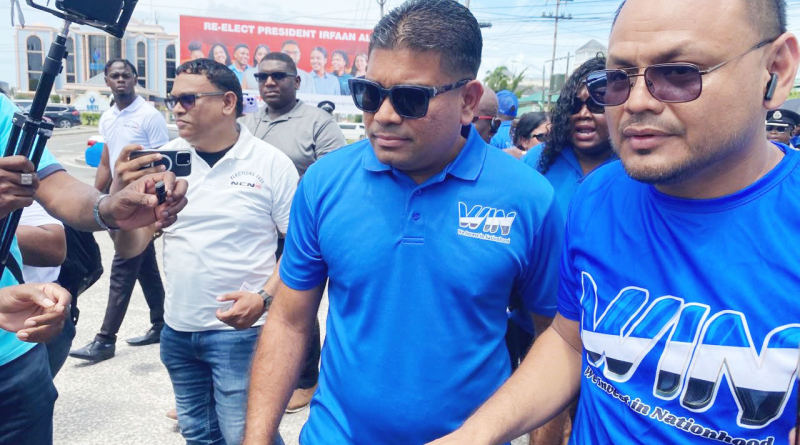Finding Hope in a Controversial Billionaire? —Guyana’s WIN popularity and how the PPP/C can curb its influence.
Finding Hope in a Controversial Billionaire? —Guyana’s WIN popularity and how the PPP/C can curb its influence.
By Judy Bissoon
Roaring through the controversy, the newfound political party, WIN (We Invest in Nationhood) spearheaded by prominent yet inexperienced “politician” Azruddin Mohamed, finds itself garnering popularity throughout Guyana. Why? Elections are looming and the momentum that WIN has found poses significant challenges for the PPP/C party (People’s Progressive Party/Civic). With no competent policy proposals on how to lead a country, a potential Mohamed presidency will only stagnate Guyana’s transformation. The current government, led by Irfaan Ali, must consolidate the unity that binds the PPP/C party and project the idea of “One Guyana” to the nation, regardless of party affiliation. The PPP/C must propose a transparent and sustainable pathway for Guyana against the backdrop of a controversial yet popular adversary.
A party that has found its footing with quite a portion of the population behind it, WIN is rooted in the ideals of “being not just a party, but a principle, purpose, and a future powered by the people for a better Guyana.” Behind this message comes businessman/presidential candidate, Azruddin Mohamed, who has found himself in a controversial political quagmire—he is currently sanctioned by the USA for approximately $50 million dollars in tax evasion charges and is facing domestic challenges such as falsified tax declarations. Despite all of this, his political appeal keeps growing with enthusiastic supporters.
The question then forms, “what is driving this popular momentum behind Mr. Mohamed?” The uncomfortable answer is that there is growing dissatisfaction with the current government, led by president Irfaan Ali. Unequivocally, this government had led Guyana through its most transformative years yet, as the country is quickly being coined a petrostate, overseeing significant developments.
However, some of the policies and initiatives enacted by the PPP/C are not necessarily sustainable nor do they tap into the unlocked potential of the citizens of Guyana. One of the reasons why WIN is gaining such traction is because of its promise of empowering the young generation through renewed approaches to the education sector, and empowering citizens to have an active role in producing a prosperous state. I recently argued that the recent cash grant initiative from the government was unsustainable as it acts like a “band-aid” fix on bigger issues. As a government seeking re-election victory, forward-thinking and sustainable planning is needed and must be reflected urgently in the last lap of campaigning for PPP/C.
President Ali and his party must be intentional with its promise to uphold democracy and engage in reforms throughout the country that seeks to benefit all Guyanese, not just the elites. Ali and the PPP/C must seek to empower the youths of the country through reinvigorated measures and opportunities to unlock their skills and talents that can be directed into diversifying and sustaining a powerful economy. Local talents must be harnessed for a growing employment sector.
Moreover, the current party must emphasize its intentions to collaborate with foreign businesses in creating a local job force for locals instead of encouraging the employment of foreign laborers rather than its citizens. By foreign businesses, I am referring to all sectors of businesses—whether restaurants and hospitality, healthcare, or even energy and oil sectors. These opportunities must not only become available for those in urban settings, but in rural settings as well.
I also argued in my previous opinion piece that reinvigorating the sugar and rice industries in Guyana is critical in terms of food security for the country. The nation has always been empowered by these two sectors, but has faced growing challenges such as lack of support and enhanced infrastructure with seemingly tenuous solutions. The current government must seek immediate revisions to their plans for the rice and sugar sectors, especially through strong and inclusive collaborations with local farmers.
The regional and general elections are scheduled to take place on September 1st, therefore reinforcing the urgency for PPP/C to revisit their party promises and re-envision a sustainable plan for governance, should they retain leadership. Mohamed and WIN are undeniably making a splash in the contemporary political setting, marking itself as a disruptor to the norms. More than ever, in the face of this challenge, the PPP/C must be intentional with projecting “One Guyana” through meaningful, transparent, and sustainable planning for the last lap of election campaigning. This is the time for the party to reflect strong intentions to empower local citizens in playing a bigger role in producing a prosperous nation, one in which benefits all.
Judy Bissoon is a second-year graduate student at the School of Diplomacy, specializing in International Security and Global Negotiations. Her academic interests lie in migration, human security, sustainable development and gender equality. With valuable experience at the United Nations, she is committed to furthering her work in multilateral environments, dedicated to advancing gender equality and human rights on a global scale. This is Judy’s second article published by the Journal of Diplomacy and International Relations.

